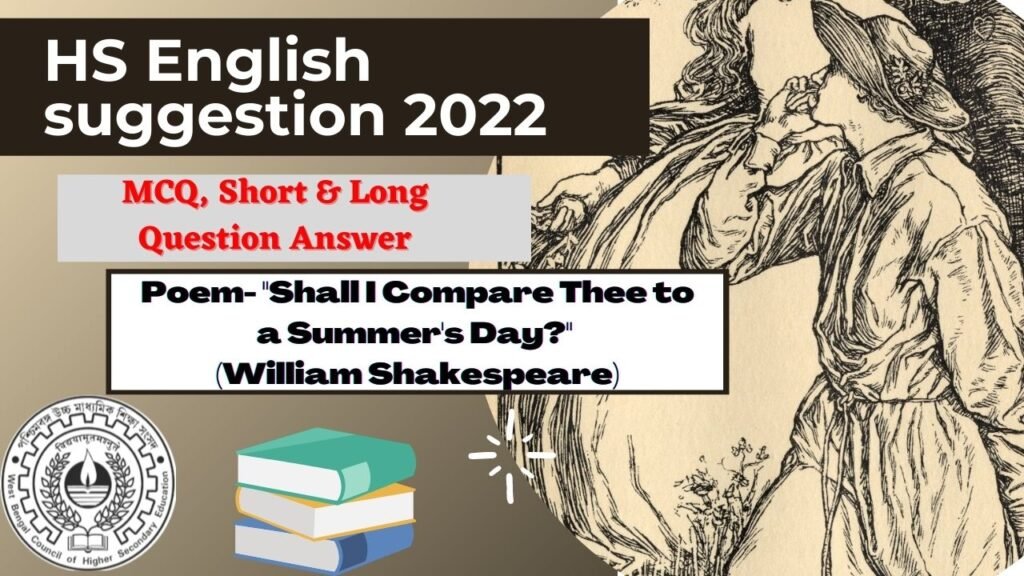WBCHSE HS English Suggestion 2022- "Shall I Compare Thee To a Summer's Day?"(William Shakespeare) | Chapter wise pdf

hs english suggestion 2022 WBCHSE all, hs english suggestion 2022 answers, hs english suggestion 2022 class 12, hs english suggestion 2022 download, hs english suggestion 2022 free download, hs english suggestion 2022 in english, hs english suggestion 2022 in english, hs english suggestion 2022 in west bengal, hs english suggestion 2022 key answer, hs english suggestion 2022 ncert solutions, hs english suggestion 2022 objective, hs english suggestion 2022 pdf, hs english suggestion 2022 pdf download, hs english suggestion 2022 question, hs english suggestion 2022 questions and answers, hs english suggestion 2022 wbchse, hs english suggestion 2022 west bengal, hs english suggestion 2022 west bengal board
HS English Suggestion 2022
HS English Suggestion 2022 (উচ্চমাধ্যমিক ইংরেজি সাজেশন 2022 (২০২২) – “Shall I Compare Thee To a Summer’s Day?”(William Shakespeare) প্রশ্ন উত্তর নিচে দেওয়া হলো। এই HS English Suggestion 2022 (উচ্চমাধ্যমিক ইংরেজি সাজেশন 2022 (২০২২) – “Shall I Compare Thee To a Summer’s Day?”(William Shakespeare) MCQ, Very Short, Short, Descriptive Question & Answer গুলি আগামী West Bengal Higher Secondary English Examination 2022 – পশ্চিমবঙ্গ উচ্চমাধ্যমিক ইংরেজি 2022 সালের পরীক্ষার জন্য খুব ইম্পর্টেন্ট। আপনারা যারা উচ্চমাধ্যমিক দ্বাদশ শ্রেণীর ইংরেজি 2022 পরীক্ষার সাজেশন খুঁজে চলেছেন, তারা নিচে দেওয়া প্রশ্নপত্র ভালো করে পড়তে পারেন। এই পরীক্ষা তে কোশ্চেন গুলো আসার সম্ভাবনা খুব বেশি।
Multiple Choice Questions (MCQ) (1 Mark): HS English Suggestion 2022 (উচ্চমাধ্যমিক ইংরেজি সাজেশন 2022 (২০২২) – "Shall I Compare Thee To a Summer's Day?"(William Shakespeare) প্রশ্ন উত্তর :-

Time's up
Short Answer Type Questions (SAQ) (1 Mark): HS English Suggestion 2022 (উচ্চমাধ্যমিক ইংরেজি সাজেশন 2022 (২০২২) – "Shall I Compare Thee To a Summer's Day?"(William Shakespeare) প্রশ্ন উত্তর :-
1.Who is the poet of Sonnet 18?
Ans.- William Shakespeare is the poet of Sonnet 18.
2. What type of a sonnet is ‘Shall I Compare Thee to a Summer’s Day’?
Ans.- ‘Shall I Compare Thee to a Summer’s Day’ is a Shakespearean sonnet which is also called an English sonnet.
3. What does Sonnet 18 deal with?
Ans.- Sonnet 18 deals with the destructive power of time and the permanence of this poetry.
4. What is the rhyming pattern of the sonnet?
Ans.- abab cdcd efef gg
5. What does William Shakespeare intend to point out in his sonnet ‘Shall I Compare Thee to a Summer’s Day’?
Ans.- William Shakespeare intends to point out in his sonnet ‘Shall I Compare Thee to a Summer’s Day’ that his friend’s incomparable beauty will live in his eternal sonnet.
6. To whom is Sonnet No. 18 addressed?
Ans.- Sonnet no. 18 is addressed to Mr W.H., probably the Earl of Southampton who was the patron of the poet.
7. Why doesn’t the poet want to compare his friend to a summer’s day?
Ans.- The poet does not want to compare his friend to a summer’s day because his friend is more lovely and more temperate than a summer’s day.
8. To whom does Shakespeare confer superiority here in this poem?
Ans.- In this poem Shakespeare confers superiority to his friend’s beauty over a summer’s day.
9. “Shall I compare thee to a summer’s day?”-Who is ‘thee’ referred to here?
Ans.- In the poem, Shakespeare’s friend and patron Mr W.H. is referred to by the word ‘thee’.
10. Why is the friend’s beauty called ‘more temperate’ than summer?
Ans.- The beauty of the friend is called ‘more temperate’ or more gentle than summer because unlike the summer’s day, it is more consistent and sustainable.
11. What do rough winds do in the season of summer?
Ans.- In summer, the rough winds shake the beautiful buds off the trees in the month of May, thereby spoiling the beauty of the season.
12. What does ‘the eye of heaven’ refer to?
Ans.- The ‘eye of heaven’ in ‘Sonnet 18’ refers to the sun.
13. “And often is his gold complexion dimmed” — Whose complexion is referred to here?
Ans.- The sun’s golden complexion is referred to here.
14. Why does every “fair from fair’ sometime decline?
Ans.- Every ‘fair from fair’ sometime declines by chance or because of nature’s changing course.
15. What is meant by ‘nature’s changing course’?
Ans.- ‘Nature’s changing course’ suggests the natural decay that time imposes upon all earthly objects.
16. How is the gold complexion’ of the sun dimmed?
Ans.- The gold complexion’ of the sun is dimmed by clouds.
17. What are the main drawbacks of the summer season?
Ans.- The season of summer is short-lived, extreme in nature and destroyer of the beauty of nature, like buds with natural phenomena like rough winds.
18. “Shall I compare thee to a summer’s day?” — Does the speaker think the comparison proper or worthy?
Ans.- The speaker thinks that the comparison of his friend’s beauty with that of summer is not worthy because unlike his friend’s beauty the beauty of a summer day suffers from inconsistencies like excessive heat or rough weather.
19. How long will the friend of the poet live?
Ans.- According to Shakespeare, his friend will live so long as men can breathe or eyes can see.
20. What will make the beauty of the poet’s friend eternal?
Ans.- The verses written by the poet will make the beauty of his friend eternal.
21. Why will the ‘eternal summer’ of the friend never fade?
Ans.- The ‘eternal summer’ of the poet’s friend will never fade precisely because the poem will immortalise the beauty of his friend.
Long Answer Type Questions (LAQ) (6 Mark): HS English Suggestion 2022 (উচ্চমাধ্যমিক ইংরেজি সাজেশন 2022 (২০২২) – "Shall I Compare Thee To a Summer's Day?"(William Shakespeare) প্রশ্ন উত্তর :-
1.How does Shakespeare compare the beauty of his friend a summer’s day in sonnet 18?
Ans.- William Shakespeare starts his Sonnet 18 with a flattering question and attempts to compare his friend to a summer’s day. In the next line, he gives us a twist. He states directly that his friend is ‘more lovely’ and ‘more temperate? He finds the similarity inadequate because there is a great difference between his friend and the summer’s day. He rejects the comparison and reasons out the negative features of summer. Summer is too changeable and short. Summer is very hot and harsh. On the other hand, his friend is young and attractive, mild and charming. His friend is perfect in every way. Nature’s summer is poor and transient. It will fade into autumn. His friend’s summer is elegant, impressive and eternal. His friend’s beauty will never fade, never die. His friend’s beauty will continue forever, live for generations.
2. What do the rough winds do? What does the phrase ‘summer’s lease’ suggest? What are the deficiencies of the summer season?
Ans.- In the poem, Shakespeare says that the rough winds sometimes shake off the ‘darling buds’ and therefore destroy the natural beauty.
The phrase ‘summer’s lease’ suggests the span of life granted to summer. This is a legal term. Here the summer’s duration is very short. The season will not continue forever. It will have its natural end according to the course of time.
There are many shortcomings that accompany the beauty of summer. The buds of the summer season are no doubt lovely but they are often destroyed by the rough winds before they can bloom completely. Again sometimes the excessive heat of the sun or the cloudy weather reveals its inconsistency.
3. What type of poem is ‘Shall I Compare Thee to a Summer’s Day’? Who is the poet? Whom does the poet speak of ? What does the poet say about the person spoken of?
Ans.- ‘Shall I Compare Thee to a Summer’s Day’ is a sonnet. . The poet is William Shakespeare.
The poet speaks of his friend, Mr. W.H. or William Herbert who was also the poet’s patron.
The poet praises the beauty of his friend His friend is more beautiful than a summer’s day. The beauty of a summer’s day is often found inconsistent as it sometimes is either too hot or cloudy. But the beauty of his friend is both impressive and restrained. The poet therefore feels an urgency to immortalise his friend. He perceives time to be omnipotent and the ravager of every mortal object, but his friend’s beauty will be eternalised through his verses.
4. How does Shakespeare immortalise his friend’s beauty?
Ans.- The poet wants to save his friend from the onslaughts () of time. The beauty of his friend is better than that of a summer’s day. The beauty of a summer’s day is often inconsistent. The sun is too hot sometimes and sometimes the sun is dimmed by clouds. At times rough winds spoil the beauty of the season. The lovely elements of summer also do not last long. So the poet realizes the futility of immortalising his friend by comparing him to a summer’s day. He perceives that only the verses written by him can eternalize the beauty of his friend. His verses are imperishable and therefore the beauty and virtues of his friend will be retained forever through these verses.
5. “…and this gives life to thee.” — What does ‘this’ refer to? Who is referred to by ‘thee’? How does ‘this’ give life?
Ans.- ‘This’ refers to the verse written by the poet, William Shakespeare.
‘Thee’ refers to the poet’s friend Mr W. H., who is also the poet’s patron.
The poet William Shakespeare infers in Sonnet No. 18, that his friend will live forever despite the cruel blows of time. This will be made possible by the immortal verses or sonnets written by the poet. The entire human race will read these sonnets as long as they thrive. In this way the friend’s beauty will be celebrated forever in this mortal world. Even the relentless march of time will be unable to destroy the fame of the friend as depicted in the sonnet.
6. What is the central idea of the poem ‘Shall I Compare Thee to a Summer’s Day’?
Ans.- In his sonnet, Shakespeare triumphs over the agonising consciousness of time by a convincing assertion of love for his friend and poetic creativity. Time can ‘shake the darling buds of May’, ‘summer’s lease hath all too short a date’, ‘every fair from fair sometime declines’, but the beauty of his friend will remain untouched. The love between him and his friend will be rejuvenated with the passage of time. Eternal lines of his verse will conquer death and time. After a long list of negatives, as in ‘ shake’, ‘too short’, ‘too hot’, ‘dimmed’, ‘declines’—which signify the power of time over nature, the reader reads the final forceful positive stroke in ‘thy eternal summer. It is the poet’s consistent love for his friend that makes him write a sonnet about him and immortalise him through his verses.
আপনাকে অসংখ্য ধন্যবাদ সময় করে আমাদের পােস্টটি পড়ার জন্য। এই ভাবেই আমাদের Studywithgenius.in ওয়েবসাইটের পাশে থাকুন। সমস্ত বিষয়ে যেকোনো প্ৰশ্ন উত্তর জানতে এই ওয়েবসাইট টি ফলাে করুন এবং নিজেকে তথ্য সমৃদ্ধ করে তুলুন , ধন্যবাদ।








